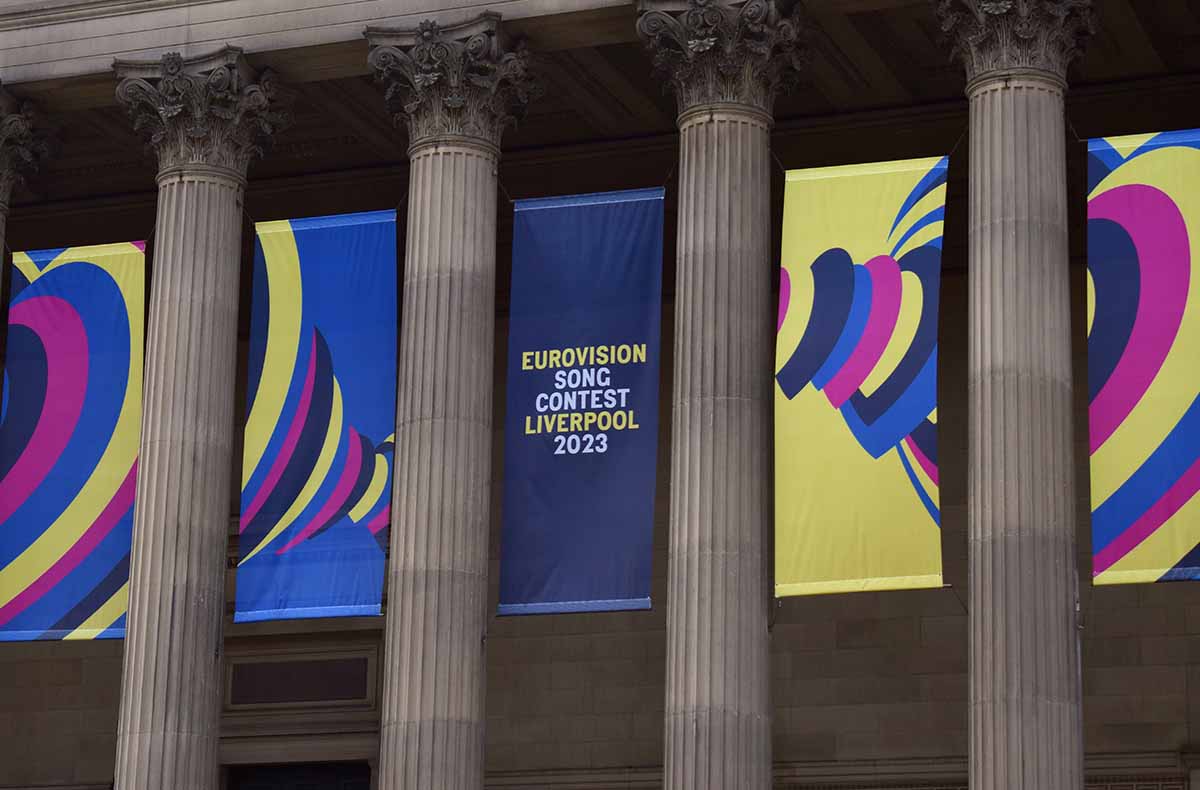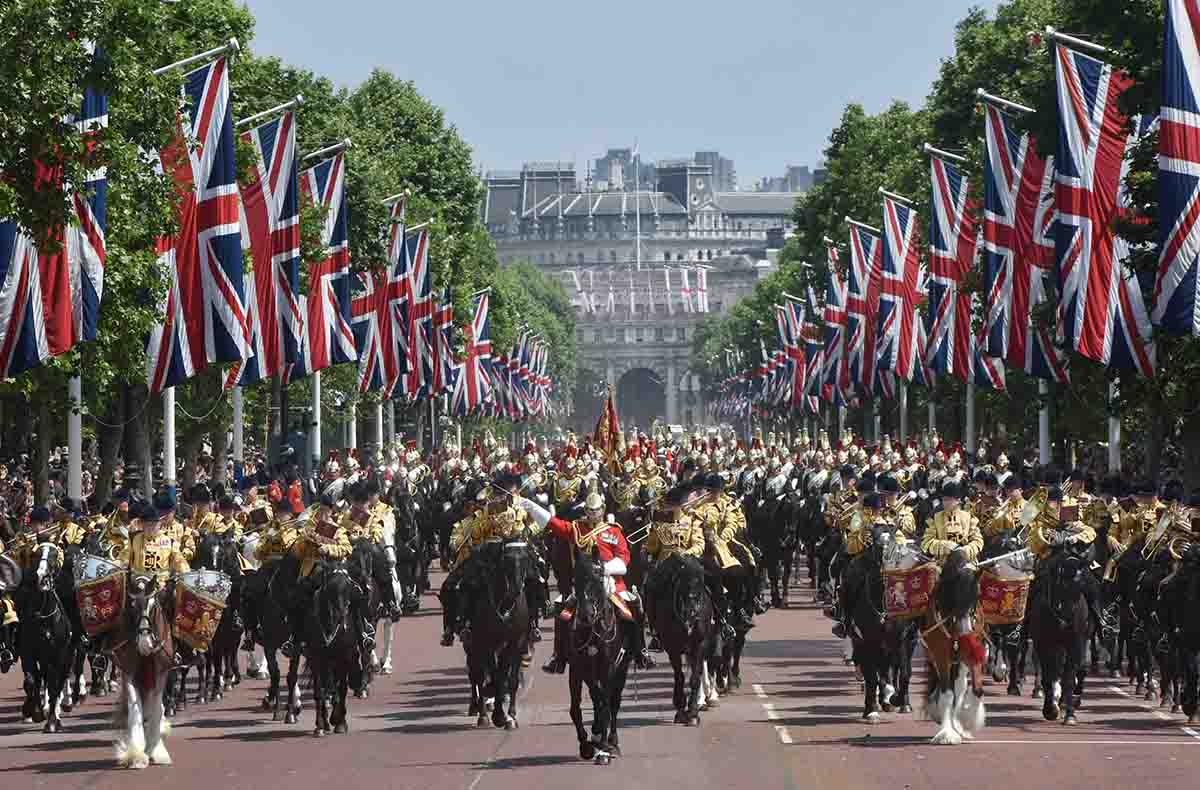
After the festival of reactionaryism comes the freakshow of Eurovision. The United Kingdom’s cultural divide has been encapsulated in eight insane days.
The Coronation, with its gammons-in-drag vibe, took place in London. The flag wavers were out in force, fetishizing tradition, the class system and imperial delusion. In Liverpool, the philosophical epicenter of resistance to ermine robes and the establishment, the Eurovision Song Contest is taking place, an occasion so jarringly woke that it looks like it has just emerged screaming from a nightmare. The two events symbolize the gulf at the heart of British life.
The usual venue for Eurovision is the home of the previous year’s winner. Ukraine’s victory in 2022 rendered that impossible due to the conflict there. Volodymyr Zelenskyy initially wanted to host the extravaganza in Mariupol but quickly realized that it would be a mistake. Russia has been banned from competing but Vladimir Putin would almost certainly have gatecrashed the party with his own lethal form of heavy metal.
As the UK finished second to Ukraine, the circus moved to Liverpool, which beat 19 other cities to the prize after a competitive bidding process. There’s an irony here because the city’s reputation across sections of British society has traditionally made it seem like a war zone. In the 1980s, the supposedly left-leaning Daily Mirror newspaper wrote that: “They should build a fence around [Liverpool] and charge admission. It has become a showcase of everything that has gone wrong in Britain’s major cities.”
Many of King Charles III’s loyal subjects will gaze upon Eurovision and have similar thoughts. A large proportion of the contest’s superfans who have flooded to the banks of the Mersey take an unconventional approach to life. The spectacle is wildly popular with the LGBTQI+ community, so much so that the phenomenon has piqued the interest of academics.
Eurovision started its existence in 1956 as a staid, cheap television show but took an unexpected turn when Dana International, the first transgender participant, won for Israel in 1998. Since the millennium things have grown increasingly bizarre. Acts have become edgier as the years have passed. Costumes have become wilder, and performers stranger.
The extremes have been mind-boggling. Lordi, a masked death metal Finnish band, won in 2006 while wearing monster costumes. Six years later, half a dozen Russian women called Buranovskiye Babushki brought a surreal form of elderly ethno-pop to the show.
A landmark winner came in 2014 when Conchita Wurst took the title. The bearded drag queen became a global sensation and upped the strangeness quotient to another level. Radical inclusivity is part of Eurovision’s attraction to obsessive fans.
By contrast, the mechanics of the competition are riddled with politics. Viewers can vote from home but the public verdict is balanced by a professional jury. Each national broadcaster selects an individual to be on the panel. A pattern of bloc voting has emerged. Scandinavian nations tend to stick together. Spain, Italy and Greece often form a Mediterranean alliance. Until recently, Ukraine, Russia and Belarus could be relied upon to support each other. Eurovision was generally a representation of the rich, shared culture of Slavic states but Putin has severed those bonds.
Ukraine’s loss is Liverpool’s gain and few places are more suited to welcome the cavalcade of oddballs that come with the show. The city’s musical credentials are impeccable and any city that produced The Beatles has to be one of the world’s pop capitals. It had hoped to host the 1994 edition of Eurovision but Sonia, a local girl and one of the favorites the previous year, was beaten into second place by the Irish entrant. Merseyside is embracing its second chance with gusto.
Connections with Ireland are the reason why Liverpool is an outlier in England. The identity of the city changed in the middle of the nineteenth century after the Great Famine. Millions of refugees came across the Irish Sea to Merseyside. Those who could afford it continued their journeys to America or Britain’s colonies but huge numbers were stranded and remained.
This city of immigrants has—with occasional exceptions—welcomed newcomers. As a port it is used to being a melting pot, albeit one that was built on profits from the slave trade. That wealth was never evenly distributed and after the Irish arrived, huge sections of the city descended into squalor. Its status as an outsider in the UK’s body politic makes it uniquely placed to accept the ragtag but flamboyant army of Eurovision camp followers.
Like most of the metropolitan areas of the UK, it is stridently anti-Brexit. The region always believed it was short-changed by Westminster and thrived because of European Union funding. The song contest provides another chance to show pride in the bonds with the Continent. It’s certainly a more appropriate location than Tel Aviv, where the 2019 festivities took place and where a clash of political perspectives caused one of the biggest rows in the competition’s history. Although the Middle East’s party capital is arguably the most accepting city in the region for the gay community, the proximity of Palestine made for an uncomfortable few days.
Madonna was the headline guest act and pro-Palestinian protestors called for her to boycott the occasion. Instead, the superstar’s performance was made even more provocative than usual when her dancers turned to display Israeli and Palestinian flags on their backs. They linked hands and walked together as the words “WAKE UP” appeared on the screen behind the singer.
Liverpool would endorse the message. Eurovision has gone full-on woke. The coronation, for all its faux inclusivity, endorsed the status quo and was rooted in the past. The fiesta of freakery on Merseyside is the other face of Britain. It’s the future, whether right-wingers like it or not.



